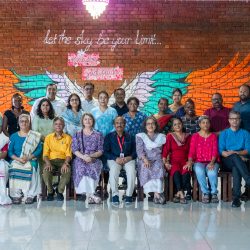What is it Like to be a 13-year-old with Cerebral Palsy in India?
And what is it like to be his single parent when the boy is unable to walk, stand or even sit up without support?
The single parent who can no longer earn a living because there is no one else to look after the boy?
Please take a minute to read an article from the New Indian Express of 16 September 2011:
Care from a mother’s heart
Could it be sheer coincidence that we came across a 13-year-old spastic child Arun G Raj at Panathura, near Kovalam, and perhaps the most personal book by Arun Shourie on his spastic child, the same day?
The answer eludes us, but seeing Arun and his absolutely devoted mother Ajitha leaves us with the same question Shourie asked – ‘Does He know a mother’s heart?’, the title of his book.
Confined to a brick-walled room, that is so dark that one has to squint to see the twisted body of a teenager on the floor, Arun looks up at the light streaming in through the open window. Then suddenly you realise that he was responding to a crow crying on the tree outside. The crow stops and he loses interest.
His lips move, but you don’t hear a thing.
At an age when most children of his age would be devouring Harry Potter, listening to heavy metal, gulping down burgers and hot dogs and generally hanging out with friends, all that Arun does in that dimly-lit room is explore the walls of the room with his palms, check out the texture of the bricks. And that too from where he lies on the cement floor.
Arun cannot walk. He cannot stand. And he cannot sit without help. With his arms and legs too thin to carry his weight, it is his mother Ajitha who carries him around.
“He was a much healthier child before. He had this beautiful bonding with his father and the duo even used to play little games together. And whenever his father asked for ‘umma’, Arun used to shower him with kisses,’’ recalls Ajitha.
It is all past tense, for Arun lost his father, Raju, four years ago to a fatal kidney disease. While Arun’s cerebral palsy does not let him comprehend the most simple things in life, the pain of parting was something the soul could not deal with. The playfulness stopped, so did the ‘ummas’. He lost interest in food too, for a long time.
But while Arun Shourie embarked upon a very personal journey to find logic and reason for extreme suffering, Ajitha has made life easier by accepting the pain. “Looking back, I think God might have made me choose the nursing profession so that I would be able to look after my child. He might have known such a child was on its way,’’ she reasons.
The sea roared, and the waves crashed with such fury against the granite boulders outside that little house, that one was left wondering whether nature itself was going wild at the unfairness of it all.
Ajitha knew something was wrong the moment the baby was born. He did not cry, not even when the nurses slapped him. When he did not suck milk, he was taken away for further investigations. They found a clot in his brain. From then on, it has been a long, long, relentless fight for Ajitha. She faltered when her husband died, but with an elder sister Suprabha, who looks after two headless families with her meagre salary, Ajitha has managed to hold on.
The death of another sister, almost at the same time as that of Ajitha’s husband’s death, robbed the families of a traditional source of income. “We used to spin coir here. But now with Suprabha working as a home-nurse and the younger generation moving away to other professions, we could not continue it here. And I cannot possibly leave him and go for work,’’ says Ajitha, who has no complaints about life – neither hers or her son’s.
Some good samaritans help the family, Pallium India supplies diapers worth ` 800, while the cost of medicines and transportation for the frequent hospitalisations is met by the SBT.
Yet, the sea raged on and on, venting out its anger on the stony shores. Maybe that was what Arun Shourie was trying to do as well.
To add to what Reema Narendran says in the article, the boy needed to see his doctor regularly to keep his convulsions under control and for the myriad ailments that he is subject to. He could have free consultations in the Government Hospital, but with his condition being what it is, it was impossible for them to handle the hours of waiting in the crowded hospital corridor that would be necessary.
A kind pediatrician offered to see him at her residence free of cost in the evenings, and that was such a relief for Arun’s mother; but then Government of Kerala banned private practice by doctors in Government service, and the pediatrician no longer wanted to risk being seen seeing patients at home.
Fortunately, at this time, Pallium India’s TIPS found him and started giving him home visits.
Now our doctor, usually the pediatrician in our team, visits him periodically. We provide him not only his diapers, but also all his medicines free of cost and a monthly food kit.





